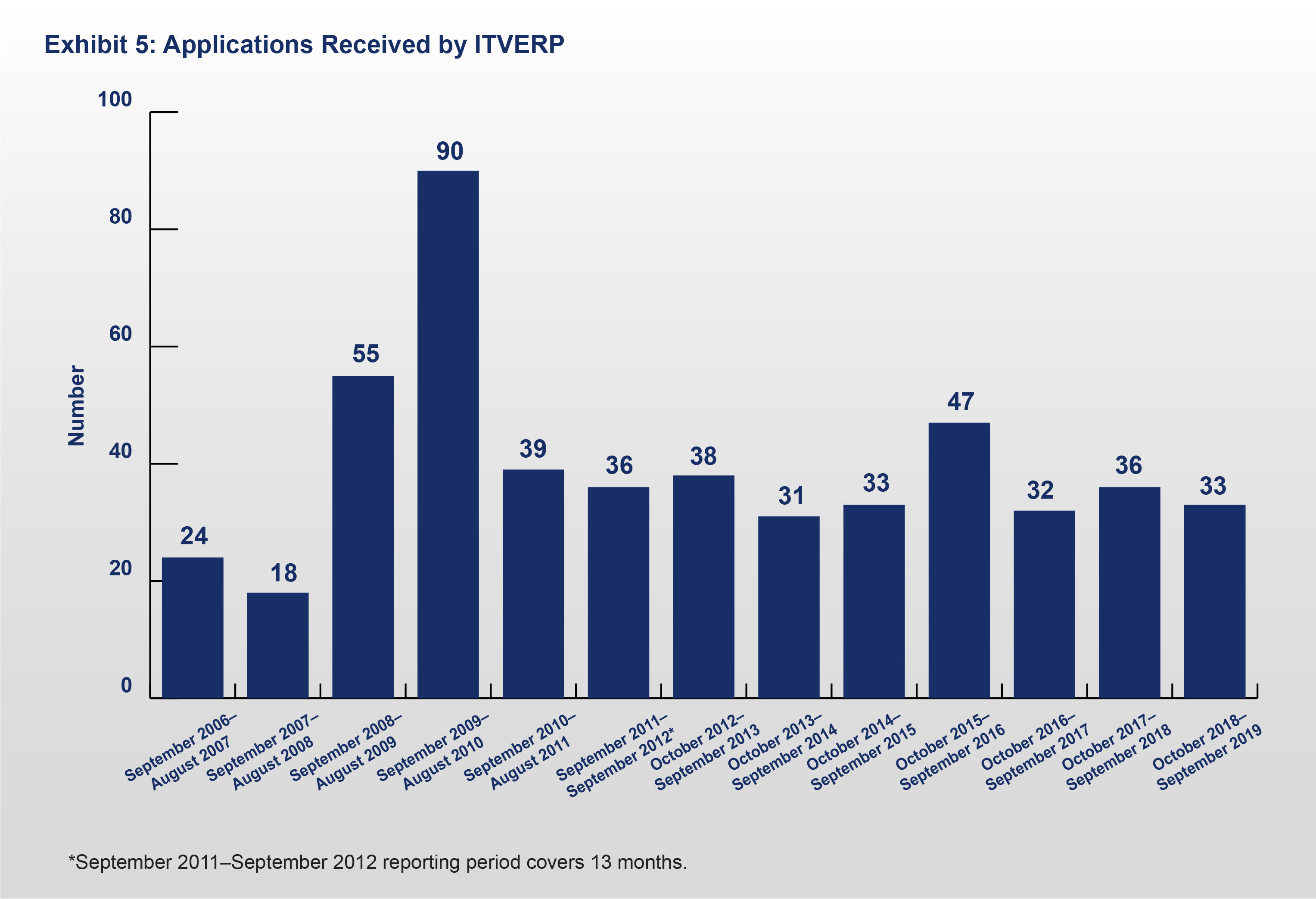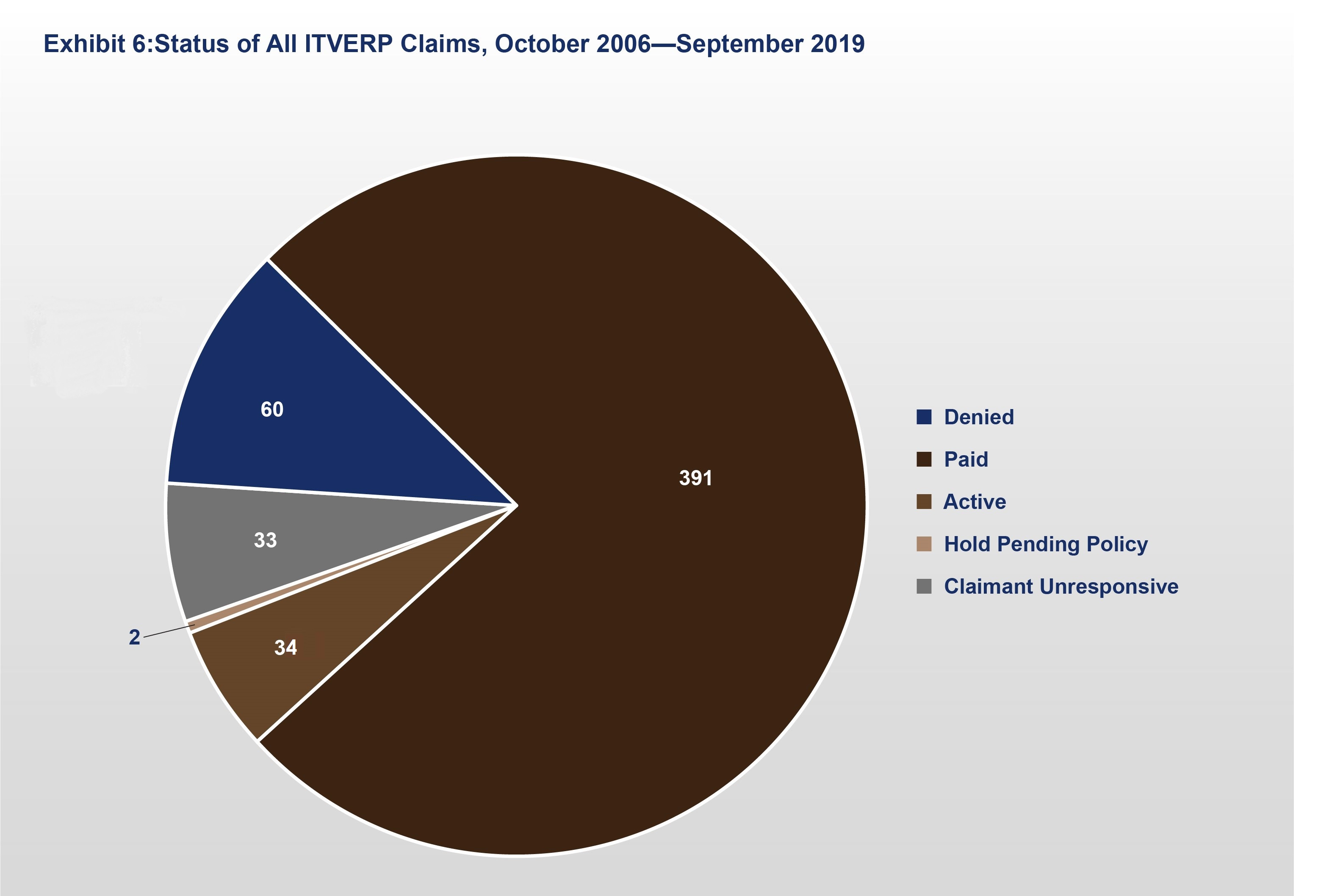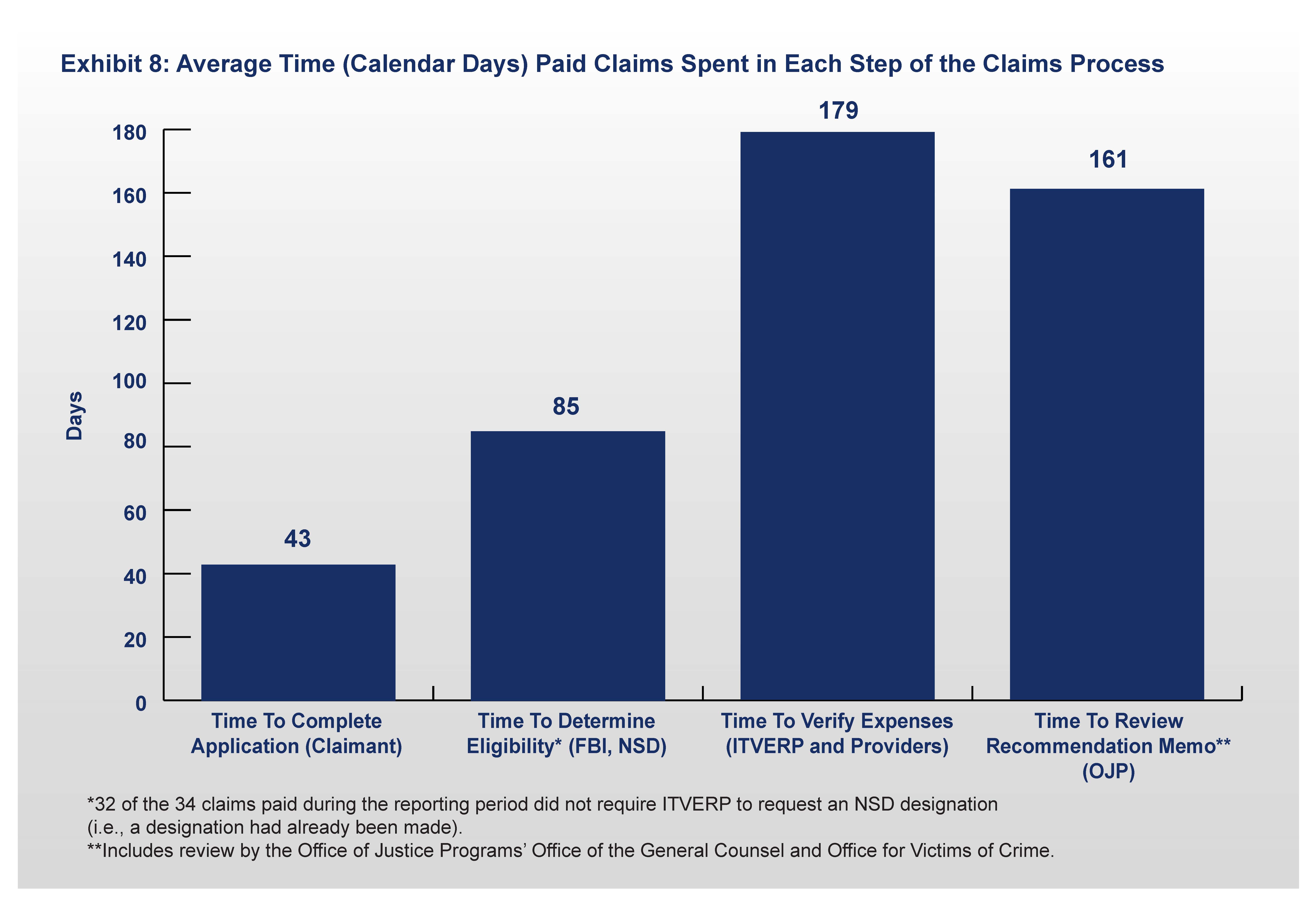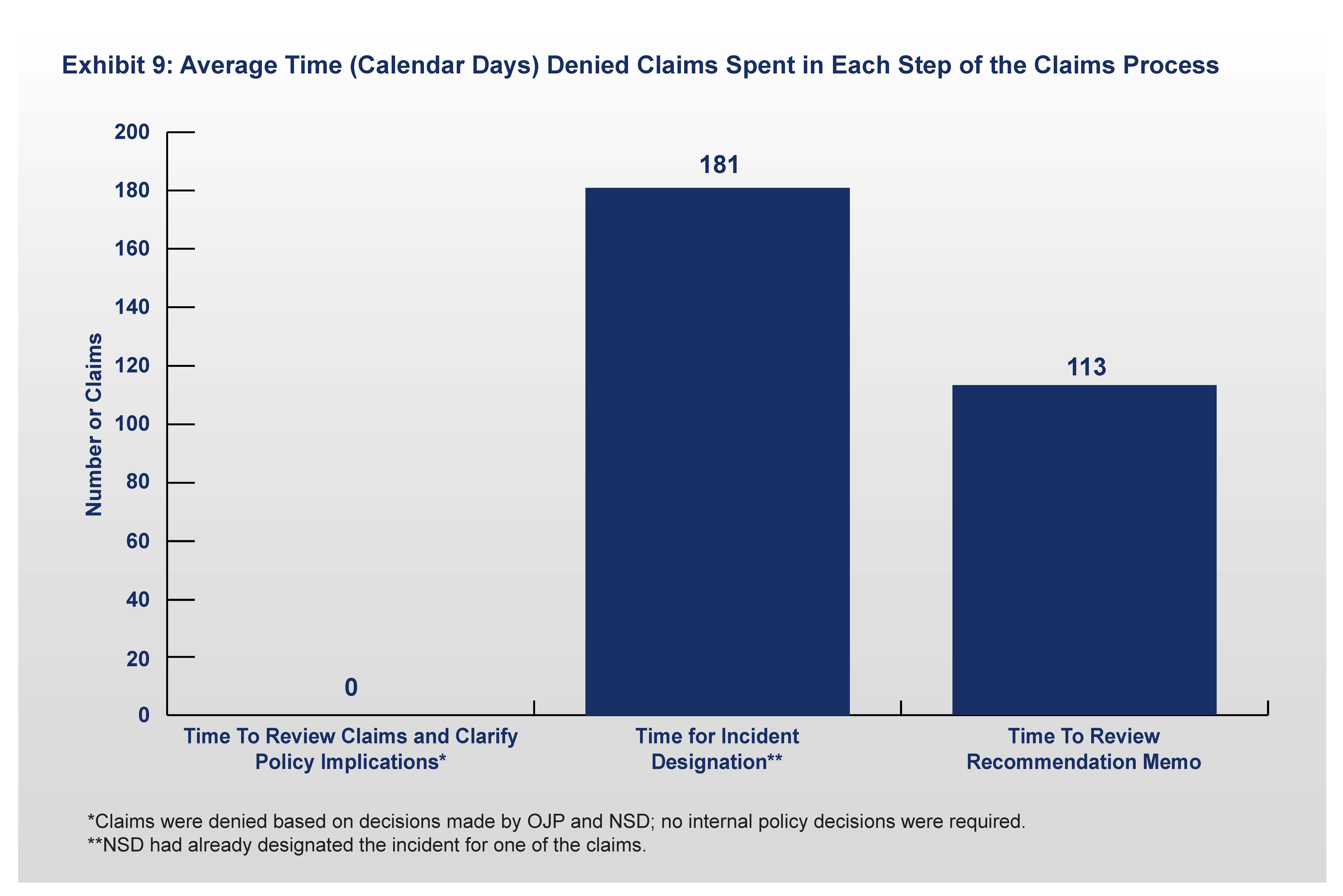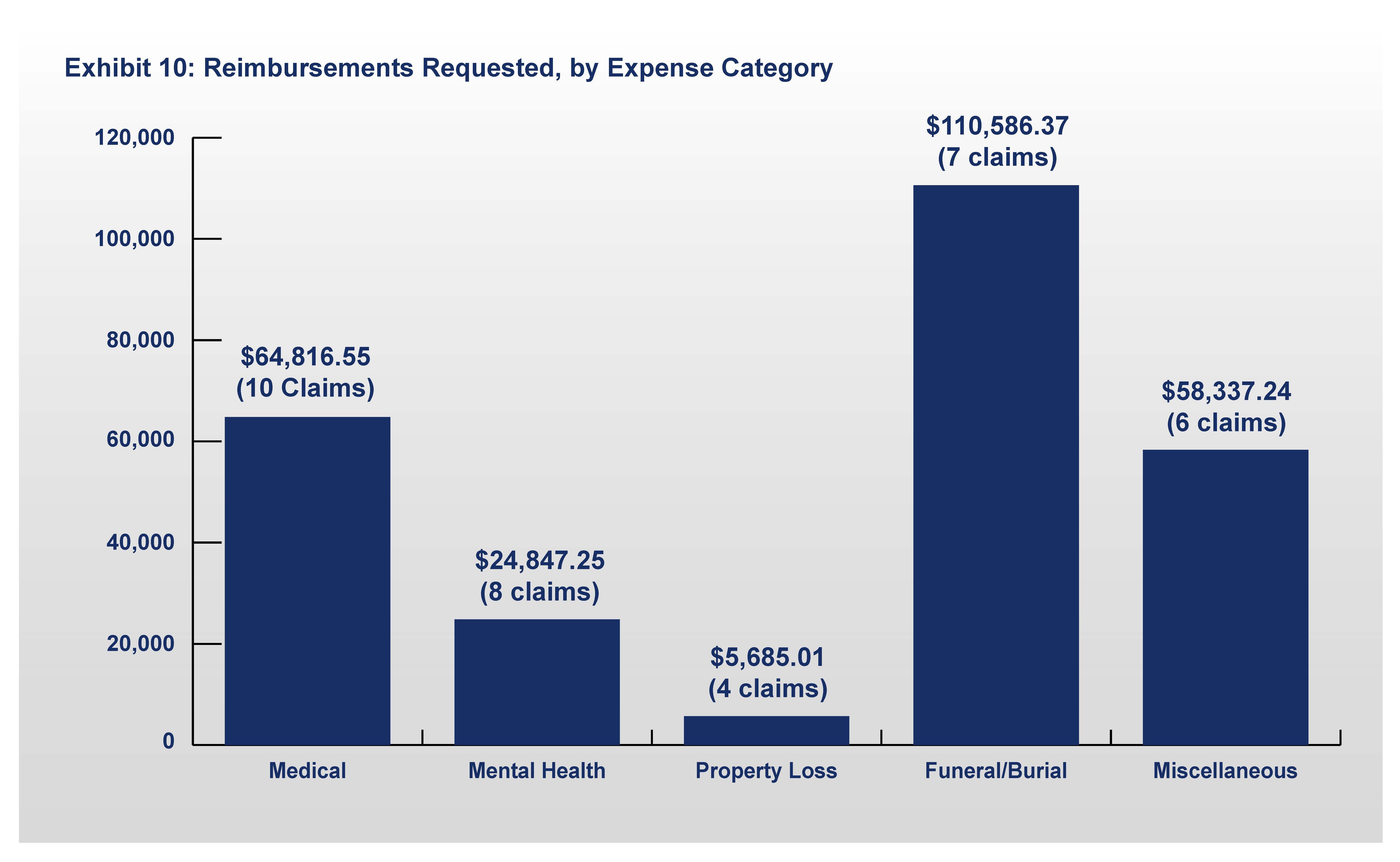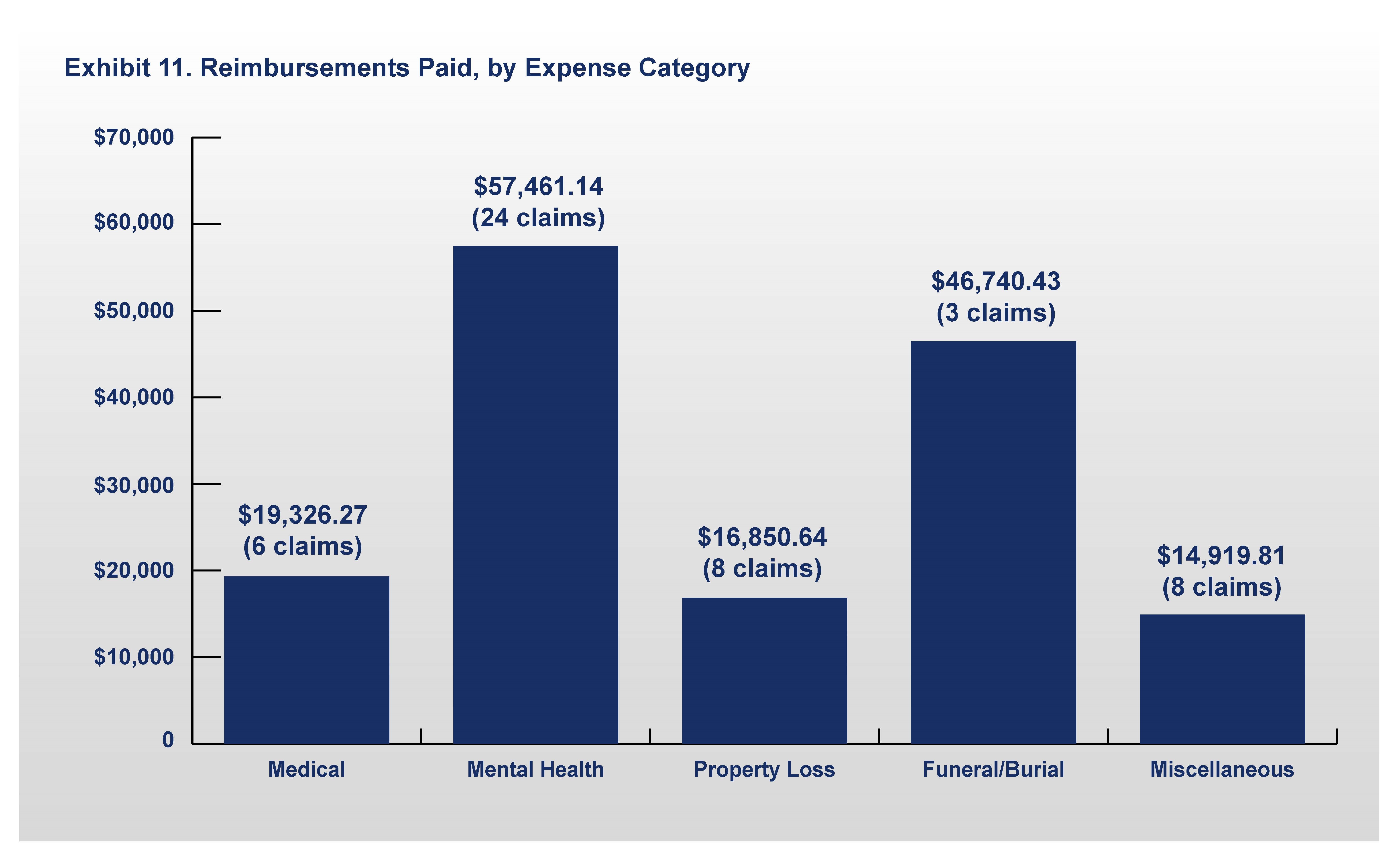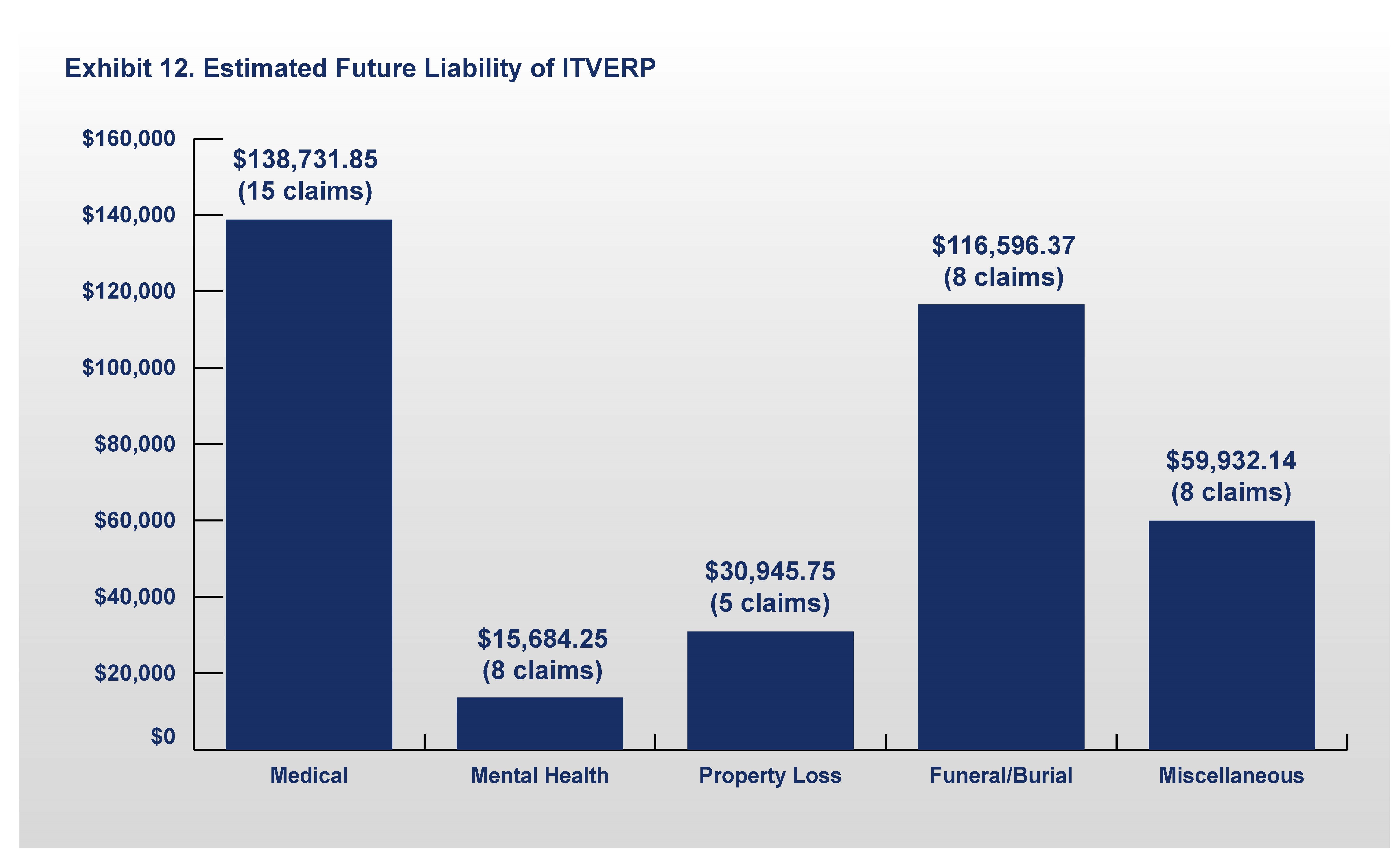ITVERP Assistance and Outreach
This report provides a summary of the International Terrorism Victim Expense Reimbursement Program's (ITVERP) activities from October 1, 2018, through September 30, 2019. It covers two critical areas of ITVERP assistance—application processing and claims payment, and public awareness activities intended to reach out to potential claimants. The report concludes with a discussion of future program needs and suggested improvements.
Program Highlights
- Continued development of and collaboration on a comprehensive ITVERP data management system.
- Outreach to current victims for ongoing medical and mental health expenses.
- Increased collaboration with other federal agency partners.
Reimbursement Activities
This section highlights the activities and accomplishments related to ITVERP's primary function of processing applications for reimbursement, including—
- the number of applications received,
- the status of claims,
- the current processing time for claims,
- details regarding reimbursements paid to claimants, and
- the number of appeals under the program to date.
Applications Received and Processed
During the reporting period, ITVERP received 33 new applications for reimbursement. The applications reflect terrorist incidents dating from September 4, 1998, to April 21, 2019. Exhibit 5 illustrates the number of applications received during each ITVERP reporting period since the program's inception in 2006.
Status of Claims
As claims move through certain phases of the application process, OVC assigns them one of four related statuses:
- Active. Active claims are those in process while ITVERP staff verifies eligibility and expenses and gathers additional information. Claims that are pending National Security Division (NSD) designation are also considered active.
- Claimant unresponsive. Frequently, claimants initiate the application process but are not responsive when asked to provide additional information to complete their application. Claimants have 120 calendar days from the time ITVERP receives their initial application to provide the necessary information or the claim becomes inactive.
- Denied. Claims are considered denied if the OVC Director determines that no reimbursement may be paid. Such claims are also considered inactive.
- Paid. Claims are considered paid after the claimants receive reimbursement. Once claims are paid they are also considered inactive.
At the end of the reporting period, there were 34 active claims, of which 14 were in process. ITVERP has paid 391 claims, denied 60 claims, and designated 33 claims as claimant unresponsive (inactive) since the implementation of the program in 2006. Exhibit 6 presents the status of all ITVERP claims.
Foreign Service National Claims
During the reporting period, ITVERP did not receive any claims from Foreign Service Nationals
Processing Time
To process claims, ITVERP requires verification of the claimant's eligibility and confirmation that the expenses submitted have been processed in compliance with ITVERP regulations. Generally, claims denied because the victims were deemed ineligible have shorter processing times because ITVERP's review is not contingent on claimants completing the application or on expenses being verified; however, depending on the reason for the denial, claims may undergo victim verification and the incident designation process before being denied. For example, if victim verification requires coordination with an investigating agency other than the Federal Bureau of Investigation (FBI), it may take time to identify the agency responsible for verification. Also, if an incident is submitted to NSD for designation as an act of terrorism, it may take time for NSD to determine whether the incident qualifies as an act of terrorism for the purpose of ITVERP. Each of the elements above affects review time. Exhibit 7 shows the average length of time it took to process the 34 paid claims and 3 denied claims during this reporting period.
Exhibits 8 and 9 show the average number of days it took for paid and denied claims to move through different steps in the claims process.
Reimbursements Requested, by Expense Category
Potential claimants who incurred multiple expenses may apply for reimbursement in more than one expense category. ITVERP case managers work closely with claimants and potential claimants to assess and fully identify their needs to ensure they receive the maximum reimbursement allowable. Exhibit 10 shows the dollar amount of reimbursements requested, by expense category, for the 33 new applications received during the reporting period. Five claimants applied for reimbursement under multiple expense categories.
Reimbursements Paid, by Expense Category
During the reporting period, ITVERP paid a total of $155,298.29 in reimbursement requests. Exhibit 11 shows the dollar amount of reimbursements paid to the 34 claimants, by each expense category, during the reporting period. Some claimants were reimbursed in multiple expense categories.
Appeals
Under ITVERP regulations, claimants may file an appeal within 30 days of receipt of the OVC Director's determination of their claim. Since the inception of the program, ITVERP has only received one appeal. No appeals were filed during the reporting period.
Future Liability
Claims that are in process represent an estimate of ITVERP's potential future liability. If the 33 active claims are paid in the amounts requested, ITVERP's potential future liability is $358,890.36. Exhibit 12 shows ITVERP's estimated future liability, by expense category.
Program Updates
Deadline Extensions
The OVC Director is authorized to use discretion to extend the filing deadline for ITVERP applications based on a showing of good cause. Of the 33 new applications received during the reporting period, 1 applicant requested—and was granted, upon a showing of good cause—an extension of the 3-year filing deadline.
Supplemental Claims
Claimants who receive reimbursement for their claim are eligible to file a supplemental claim for ongoing expenses related to the incident. Eighteen of the 33 claims received by ITVERP during the reporting period were supplemental claims; 13 of the 18 supplemental claims requested reimbursement for ongoing mental health expenses.
Promoting Public Awareness
Victims of terrorism must focus on their immediate medical, mental health, family, housing, and other needs and those of their loved ones. Many victims and their families are not aware of the resources available to them. A critical ongoing effort for ITVERP is to reach out to victims of international terrorist incidents and their families to inform them of the assistance this program offers. Outreach activities primarily focus on two specific groups: victims, survivors, and families of terrorism victims who are considered potential claimants; and collaborating agencies and organizations that may have contact with potential claimants. This section describes ITVERP's outreach efforts during the reporting period.
Outreach to Potential Claimants
ITVERP's outreach efforts focus on victims of international acts of terrorism and their family members who may be eligible for reimbursement under the program. OVC coordinates with the FBI's Victim Services Division (VSD) and the U.S. Department of State (DOS) to identify potential claimants. When terrorism incidents occur outside the United States, DOS is the first to respond, locating and identifying U.S. citizens. VSD then responds, where appropriate, to provide victims or their families with information about ITVERP as a potential resource. For individuals who choose to apply for benefits, ITVERP case managers verify eligibility and deliver support and assistance throughout the application intake and claims verification process. Additionally, ITVERP case managers conduct outreach to existing and prior claimants to inquire as to whether they have additional expenses to submit for reimbursement. During the reporting period, ITVERP sent individual outreach letters to 31 potential claimants.
Outreach to Collaborating Agencies and Organizations
Another goal of OVC's outreach efforts is to educate the victim assistance community, including collaborating agencies and potential partners, about ITVERP. By reaching out to branches of the military and international nongovernmental organizations (NGO), as well as individuals who may come into contact with victims of international terrorism, OVC increases awareness about ITVERP and the financial support available.
ITVERP staff attended the annual Victims of Crime Act (VOCA) Conference in August 2019. This provided an opportunity for case managers to meet with individual state victim compensation program representatives and exchange information, and to distribute contact cards to victim service professionals interested in the program. Information about ITVERP was also available at the OVC table.
ITVERP Resource Center
The ITVERP Resource Center responds to questions and requests made through its dedicated toll-free helpline and email address. Program staff are available to respond to inquiries Monday through Friday. Federal, state, and local government agency staff and NGOs contact the resource center on behalf of specific individuals to obtain information about the program's eligibility requirements and to provide information about potential claimants who might qualify for ITVERP reimbursement. ITVERP staff respond directly to victims who call the helpline for assistance with their applications, inquiries about the types of expenses the program covers, and information about program eligibility requirements.
ITVERP Incoming and Outgoing Contacts
Helpline Calls: ITVERP received 825 calls and made 74 calls.
Emails: ITVERP received 5,540 emails and sent 88 emails.
For helpline callers who do not speak English, the staff accesses LanguageLine Solutions, which allows for effective, real-time communication with the caller. During the reporting period, ITVERP accessed LanguageLine to obtain translation and verification from medical providers who spoke Hebrew and Arabic. Additionally, ITVERP used LanguageLine to speak with two claimants whose primary language was Arabic.
ITVERP Customer Service
During the reporting period, ITVERP was not able to obtain any responses to the Claimant Feedback Tool; however, many claimants provided feedback directly to their case managers. The length of the review process was commonly mentioned as being too long. Several claimants also stated that they found the application itself cumbersome, due to the number of documents and the amount of information required. Most claimants gave feedback that their case manager was helpful and that they appreciated the work done on their claims.
On April 23, 2019, OVC and OCIO launched the ITVERP Portal as both an internal system and an online application portal. Using the new website, claimants and potential claimants can begin the reimbursement request process, add supporting documentation to their claims as it becomes available, and submit their completed applications. Since the system went live, ITVERP has continued to work with OCIO to address feedback from users on both sides of the system.
Future Program Needs and Improvements
Complexity of Claims
As a reimbursement program, ITVERP is not a typical claims or compensation program. It is unique in that it requires significant due diligence and review of each expense before reimbursement can occur. Around the world, terrorism incidents have increased in both frequency and number of casualties. These incidents add complexity to the program and require continued navigation of and decisionmaking around new issues that arise from uncommon and sensitive reimbursement requests.
Currently, ITVERP does not allow for reimbursement of mental health expenses incurred by family members in cases where the victim survives. This issue arose in a case where the spouse was attending physiotherapy with the victim. The spouse requested reimbursement for her own mental health costs, which was denied. ITVERP has also denied requests for reimbursement of mental health expenses in the past when family members of surviving kidnap victims have applied for mental health reimbursement expenses.
ITVERP also tracks the number of claims that reach a category maximum for reimbursement. In the mental health category, 54 claimants have reached the category cap (although all categories have had claimants reach the maximum while still having ongoing expenses). Raising the category maximums to reflect and accommodate claimants' needs would be beneficial to the program.
In the last year, ITVERP also reviewed the policy regarding catering for funeral and burial services. Food is an integral part of the grieving process for many cultures, and ITVERP should not limit those who require catering so long as they can provide receipts and do not exceed the category maximum.
Outreach and Program Partnerships
ITVERP continually conducts outreach to ensure potential claimants know about this unique program. VSD provides most of the potential claimants for ITVERP's outreach activities; however, in the immediate aftermath of some mass violence incidents abroad, VSD makes an effort to involve ITVERP in providing assistance to identified victims. Most of these potential claimants inquire about receiving "compensation," not reimbursement. In these cases, ITVERP must market the program with a focus on its policy to "reimburse" for incurred expenses as a direct result of the incident; but also provide alternatives to ITVERP for potential claimants who may need immediate compensation assistance. ITVERP and VSD meet regularly to refine this type of outreach and the process for serving victims most effectively. This initiative strengthens ITVERP's partnership with VSD by allowing them to work together on their shared goal to better serve victims and their surviving family members.
ITVERP will continue to provide information and establish connections with state programs and victim service providers at the annual Victims of Crime Act (VOCA) Conference. In the future, ITVERP hopes to host its own conference workshop focused on spreading awareness about the program.


